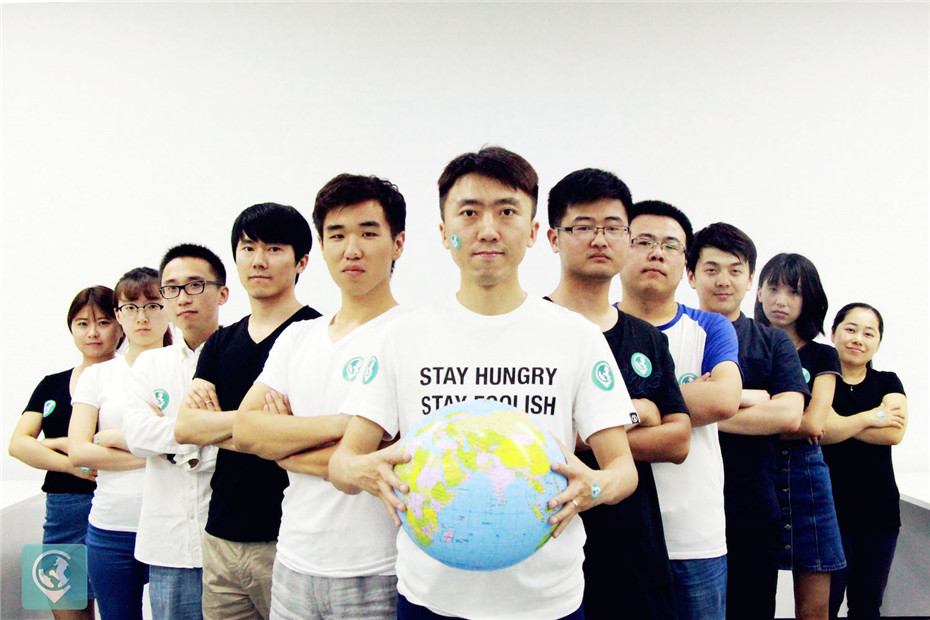
Years of overseas experience enables Cui Guangri to seize the business opportunity of developing a world tour map.
Born in yanbian area, Jilin province, Cui Guangri belongs to the Korean ethnic group. He has been working at SK HOLDINGS Beijing office as a developer since 2007, so he commutes between Beijing and Seoul and eats at restaurants in Seoul very often. After working for so many years, he noticed some changes. There are more and more Chinese people traveling by plane. An increasing number of Chinese travelers go to Seoul, and Chinese tourists can be seen at every corner of the tourist sites. On contrary, labor cost in Beijing is constantly rising, so many Korean companies start to rethink their engineering development in Beijing.
Cui Guangri has a sharp insight into cross-cultural differences. Before he went to university in Beijing in 1998, his living environment was dominated by Korean culture. At school, he can choose Russian and Japanese as foreign language study, while Korean and mandarin accounted for 50% respectively in literature score. When he was even younger, he was interested in an outbound travel show called Chaidai Programmes. He felt extremely excited when the host asked in curiosity, “What is this?” In 1998, he was once on his way to Beijing, he spoke mandarin to others on the train for over an hour for the first time. His roommates at BUPT were from different provinces such as Anhui, Guangdong, Hainan, Qinghai, Zhejiang, etc, which cultivated his ability to discover business opportunities through cross-cultural differences.
Official data from CNTA supported Cui Guangri’s observations. According to statistics, over 122 million people went abroad in 2016, among which over 70 million were self-guided, spending $900 per person and $109.8 billion in total. Over 120 million Chinese citizens have passports. The annual growth rate of outbound travel was over 20%. A variety of travel websites, online travel products and communities have been emerging. This is a huge market.

However, Cui Guangri, who is used to multi-culture environments, discovered a more delicate perspective, i.e. map. The map industry in China has long been dominated by Amap and Baidu Map which are largely adopted by Chinese users. Once abroad, they do not feel comfortable using Google Map due to language and habit differences. And the information about transportation, restaurants, tourist sites are not adjusted for Chinese travelors. More importantly, due to some policy restrictions, map apps cannot be integrated in and out of China.
Cui Guangri's idea is to bring services in Dianping, DiDi and payment discount that Chinese consumers have adapted to oversea map development. This is a good solution that meet needs from both national policy and Chinese consumers. This sounds like a feasible business plan.
XikeMap is Guangri’s second undertaking. At the end of 2009, he left SK and set up an video ad-placing company by image recognition technology with five friends. Unfortunately, despite of his innovative idea and technology, his business failed after 6 months.
However, xikeMap has several advantages over Cui Guangri’s first undertaking. First, the startup team of xikeMap are those who worked with him 8 years ago. Second, he gained rich project management experience through software outsourcing services. The more challenges he faces, the more concrete and mature his concept becomes.
In 2015, Cui Guangri started persuading his former teammates to join the new project. At the beginning of 2016, the first version of xikeMap was completed with those primary functions Cui envisioned.
But it’s always hard to turn visions into reality.
Chinese travelers have set their foot on every land in the world. The first challenge for Cui Guangri is whether xikeMap can be a good map for world tour. Ever since his study in School of communications at BUTP, Cui Guangri has been devoted to communication, AI and the Internet for 20 years. “Only real challenges can make geeks excited!” Led by Cui Guangri, the startup team finished the world tour map at an austere incubator after working round the clock for 592 days.
The second challenge for xikeMap is how to attract users. Afterall, certain regulations and usage habits have been established in the outbound travel market. Cui Guangri did some promotions in Korea, but it seemed not down-to-earth enough to achieve a satisfatory retention rate. Cui Guangri realized that customers could never be bought. XikeMap must find market entry more carefully.
Luckily, Uroaming, a largest mobile wifi supplier in China, became xikeMap’s angel investor and channel partner for marketing. They both benefited a lot from their cooperation. XikeMap targeted at users of Uroaming who are all outbound travelers and thus find an effective way to attract users.
JV Review
JadeValue invested in xikeMap because the trend we see in outbound travel market. Also, xikeMap has the potential to combine product scenes with travel insurance. Providing with not only investment capital, JV but also helps xikeMap to make business development strategies, target marketing channels and turn visions into real business. Our ultimate goal is to achieve a win-win situation, where startups and investors both reach their business goals.